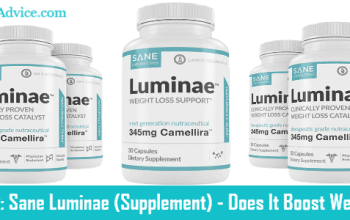
What are Saxenda’s side effects?
In case you're not familiar with it, it's a weight loss prescription drug that has increased in popularity lately.
However – this drug raised a lot of concerns lately.
What's its most serious issue? The fact that it could cause depression and suicidal thoughts.
Is there any truth in this claim? Well, we're going to find out below!
Note: This article includes references and studies on Saxenda and its side effects.
Saxenda And Suicidal Thoughts & Depression? (In A Nutshell)
Shortly, does Saxenda cause suicidal thoughts and depression? Most likely YES.
There are recent reports about people who experienced these issues while on Saxenda.
However, keep in mind that only a very small percentage of user are complaining about this.
Now, why could this drug cause mental health issues?
To give you an idea – Saxenda contains liraglutide (GLP-1 receptor agonist), that is supposed to bring in several benefits:
- suppresses appetite
- delays gastric juice emptying
- decreases blood sugar levels
- increases insulin production
In addition – liraglutide's mechanism of action involves the neuronal pathways.
Since it has the ability to modulate some neurotransmitters, it might go beyond that.
For instance, it could affect related hormones or minerals.
However, researchers still need additional studies to establish the relationship between the two factors.
As of the moment, we can only account for the reason behind depression and suicidal ideation with how liraglutide works.
Additionally, the lines below point out the other top side effects of Saxenda:
- very low blood sugar (hypoglycemia)
- digestive discomfort
- gallbladder problems
- nausea, vomiting, fatigue or rashes
- increased heart rate or kidney failure
The best thing to do is to study Saxenda first.
There's actually a list of certain health conditions that are not compatible with it.
Obviously, if you're suffering from one of them, you absolutely need to avoid this drug.
Now – if you're looking for a weight loss product that is completely on the safe side, I have a suggestion.
It's actually my top recommended supplement for weight loss and it's called PhenQ.
There are so many people that swear by its results.
And unlike Saxenda, it doesn't affect mental health and it doesn't cause most of the regular side reactions of weight loss products.
If I wanted to lose weight, PhenQ is surely the option I would go for straight away.
Saxenda's Culprits
Firstly – let's discuss the composition and features of Saxenda®.
It's an injectable weight loss medication that contains 3 mg of liraglutide.
In terms of goal, it's prescribed to people with the following health conditions [1]:
- adults with excess weight (BMI ≥ 27) and weight-related medical issues
- people who are obese or have a BMI ≥ 30
- children between 12-17 years old with weight above 60 kg (132 pounds)
- overweight users or people with type 2 diabetes mellitus
Now – let's further focus on liraglutide, which is the main active ingredient of Saxenda.
It's a synthetic molecule that imitates the action of GLP-1 (glucagon-like peptide-1) receptor agonist [2].
Here's how it works inside your body [3]:
- delays down gastric juice emptying
- suppresses appetite via neuronal pathways
- decreases blood glucose levels
- regulates insulin secretion
- controls the production of various neurotransmitters
Consequently, its potential results include weight loss, decreased appetite/cravings and increased satiety.
At first – these results sound very promising.
But liraglutide might cause mood impairment and cognitive decline in other situations:
- has the ability to alter and modulate neurotransmitter levels [4]
- some of these neurotransmitters are hormones responsible for energy, happiness and relaxation
- this can lead to mental health problems
Keep in mind that the relationship between the drug and these side effects is not yet fully established.
Also – the reported cases are rare and still needed further investigations.
Although liraglutide has antidepressant effects [5], its results are actually contradicting.
It does help with depression in some cases, but it actually worsens them in others.
So there's a lot more research needed on this topic.
But overall, this major side effects of Saxenda could be caused by its involvement in neuronal pathways.
Saxenda's Top Side Effects
In this chapter, we're going to discuss the major adverse reactions of Saxenda.
Also – let's talk about how (and why) this drug can potentially cause each of them.
But first of all – be aware that Saxenda shouldn't be used by people with certain health conditions [6]:
- Medullary Thyroid Cancer (MTC)
- Multiple Endocrine Neoplasia Type 2 (MEN 2)
- allergy to liraglutide
- severe stomach problems or digestive problems
- existing issues in the liver, kidney or pancreas
- history of mental health issues
- women who are pregnant/planning to be pregnant and breastfeeding
- people taking other GLP-1 receptor agonist medicines
With that – let's look at each possible adverse effect of Saxenda.
1. Hypoglycemia
Firstly – hypoglycemia is defined as low blood glucose levels (than normal) [7].
In some cases, obesity is linked to type 2 diabetes (but not all the time, since diabetes has several causes).
But to clarify – Saxenda is not designed to cure any type of diabetes.
It can only delay its development and its potential repercussions, by fighting obesity.
Consequently, it can help diabetes-related complications, because it targets excess weight.
Now, liraglutide increases insulin production in order to reduce blood glucose levels [8].
For this reason, it's not recommended to use Saxenda if you're already taking medicines for type 2 diabetes.
If you do so – you're at risk of hypoglycemia.
2. Digestive Issues
Another common side effect of Saxenda is poor digestion:
- diarrhea
- constipation
- stomach cramps
Actually – you can also see these secondary reactions stated on their website.
Their main culprit is the way your body reacts and adjusts to this medication.
These digestive issues usually appear during the first few weeks or whenever you increase the dose.
Another factor to look at is the smaller servings you start consuming,
Again – Saxenda works by regulating your appetite, so your eating habits will definitely change with it.
But in most cases, these adverse effects don't last long.
3. Pancreatic Inflammation
Let's now focus on how this drugs can damage the pancreas (in the worst-case scenario).
As I mentioned, if you already have an existing problem with your pancreas, avoid Saxenda right away.
That's because GLP-1 receptor agonists like liraglutide can elevate insulin secretion [9].
Plus, they can increase the rate of cell growth around the pancreas.
But their rapid proliferation combined with high insulin levels can lead to serious issues.
They can cause acute to chronic pancreatic inflammation and other complications [10].
For this reason – be aware of the guidelines about who should and shouldn't use Saxenda.
In that way, you can avoid any pancreatic problems (especially if you already have some).
On the other hand, you should still be careful even if your pancreas is healthy.
If you're already taking other GLP-1 receptor agonist medications, you're already at risk.
4. Gallbladder Problems
Usually – rapid weight loss can also cause gallstones [11]:
That's because the liver secretes cholesterol in the bile when your body metabolizes fat.
In this way, the excess production of cholesterol can produce gallstones.
Also – since Saxenda regulates your satiety, you might undergo fasting (without even noticing it).
As a consequence, this would lead to a decrease in gallbladder movement [12].
Besides, the bile would be filled with cholesterol (which is a risk factor for gallstones).
So overall – Saxenda could cause gallstones since, it's a weight loss medication.
Although the chances are slim, some people can experience this side reaction.
That's why it's best to consult a doctor, especially if you already have a history of gallstones.
5. Most Common Side Effects
Meanwhile, here are the most familiar secondary reactions that you can get with Saxenda:
- nausea or headache
- vomiting
- fatigue or dizziness
- allergic reactions
- rashes or swollen injection site
Unfortunately, these side reactions are pretty common in all weight loss drugs.
That's why most people won't even experience them.
The main possible reason for the first 4 points is that your body needs time to adjust to Saxenda.
For the last one, it could be because you're not using the drug correctly.
Remember – you need to inject Saxenda under the skin (abdomen, thigh or upper arm).
In order to avoid lumps, you need to rotate your injection site in every use.
Overall – all of the adverse reactions in this category are not that serious (as long as you're taking precautions).
6. Other Side Effects
Lastly – let me list down the other side reactions that are quite dangerous:
- kidney problems
- increased heart rate
- suicidal thoughts or depression
Firstly – dehydration can hurt the kidneys, so make sure to be well-hydrated while using Saxenda.
Also, in case of an elevated heart rate, you should tell your doctor immediately.
Weight loss drug shouldn't cause this problem at all.
Lastly – there are reports of depression or suicidal ideation while using Saxenda.
Again, that's most likely because of its involvement in neuronal pathways.
To sum it up, the side effects above are pretty serious but shouldn't appear in most cases.
In case you do experience them, it's best to stop using Saxenda and talk to your doctor.
Conclusion
Overall – Saxenda has a lot of potential adverse reactions.
Some of them are mild, since your body will need time to adjust to it.
But in more serious cases, talking to your doctor might be necessary.
That's why I highly recommend you you read its guidelines first.
In that way, you can avoid any possible side effects (especially the risky ones).
Final Conclusion
To sum it up, Saxenda is a weight loss prescription medication in the form of an injection.
Although it does work in some cases, it comes with some huge risks.
The most scary ones are probably suicidal thoughts and depression.
Even so, there's a very small percentage of people who experienced these issues.
Now – they can be accounted to Saxenda's main active ingredient (liraglutide).
It's a GLP-1 receptor agonist and its mechanism involves the neuronal pathways.
That's probably why there are so many psychiatric issues with this drug.
With that, people with histories of mental health issues should talk to their doctors before using Saxenda.
Additionally – here are the other possible adverse reactions it might cause:
- hypoglycemia
- digestive problems
- issues in the gallbladder
- digestive issues (nausea, fatigue, vomiting or rashes)
- risky side effects (elevated heart rate or kidney problems)
Again – there's a list of guidelines about people who shouldn't use Saxenda.
I have talked about them in detail above.
So if you're one of those people, it's best to avoid this drug completely (or in the best case, talk to your doctor first).

I'm talking about my #1 recommended weight loss supplement called PhenQ:
- no risks of suicide, depression or other mental health issues
- results are much better and last in the long run
- comes with 5 different mechanisms of action that target weight gain
- high-quality features with a decent price tag
- a lot of users swore by its great results
So if you want to lose weight safely, better choose PhenQ instead.
I strongly recommend it if you don't want a prescription medication for losing weight (as they can be quite dangerous).
Not only that, but it can also help you control your cravings and reduce further fat gain.
So it's clearly the best you can get from this point of view.
References:
1 – https://www.saxenda.com/-what-is-saxenda/
2 – https://www.sciencedirect.com/-topics/-liraglutide/
3 – https://www.ncbi.nlm.nih.gov/-pmc/articles/-PMC5358074/
4 – https://www.ncbi.nlm.nih.gov/-pmc/articles/-PMC7456867/
5 – https://pubmed.ncbi.nlm.nih.gov/-36566932/
6 – https://www.saxenda.com/-who-should-not-use-saxenda/
7 – https://www.niddk.nih.gov/-health-information/diabetes/overview/-hypoglycemia/
8 – https://www.ncbi.nlm.nih.gov/-pmc/articles/-PMC3705157/
9 – https://www.ncbi.nlm.nih.gov/-pmc/articles/-PMC4698438/
10 – https://www.sciencedirect.com/-science/article/-S2376060520302881/
11 – https://www.hopkinsmedicine.org/-health/conditions-and-diseases/-gallstones/
12 – https://www.ncbi.nlm.nih.gov/-pmc/articles/-PMC1419405/












